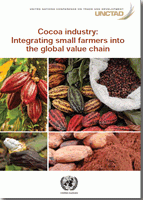
Cocoa is of significant economic importance both for producing and consuming countries. It generates export revenues, income and employment. Cocoa is an important ingredient in the confectionery, and food and beverage industries, and, more recently, in the pharmaceutical and cosmetics industries.
Therefore, ensuring sustainability of cocoa production is critical, particularly at a time when most young people do not consider farming, including cocoa farming, a viable business choice. In the case of cocoa, this is probably due to the low profitability of its farming businesses and the relatively poor living standards of cocoa growers.
In order to make cocoa farming a more viable source of livelihoods so as to attract younger people and ensure a sustainable global cocoa economy, it will be essential to reorganize the cocoa farming business to enable farmers to obtain higher prices.
This report contributes to research on the cocoa global value chain (GVC). It examines consolidation patterns in the cocoa industry and their potential impacts on stakeholders along the value chain, in particular small cocoa farmers who constitute the backbone of cocoa production worldwide. It also discusses these farmers’ integration into world cocoa markets, highlighting some critical issues they face.
The report finally offers some policy recommendations which may help governments, the private sector, the international community and producers to foster the development of a sustainable cocoa economy by empowering farmers, consonant with the Global Cocoa Agenda adopted at the first World Cocoa Conference in Abidjan in 2012.
The report should ultimately contribute to the debate on how to attain the Sustainable Development Goals (SDGs) with their commitment to "leave no on behind", especially in cocoa farming communities.


